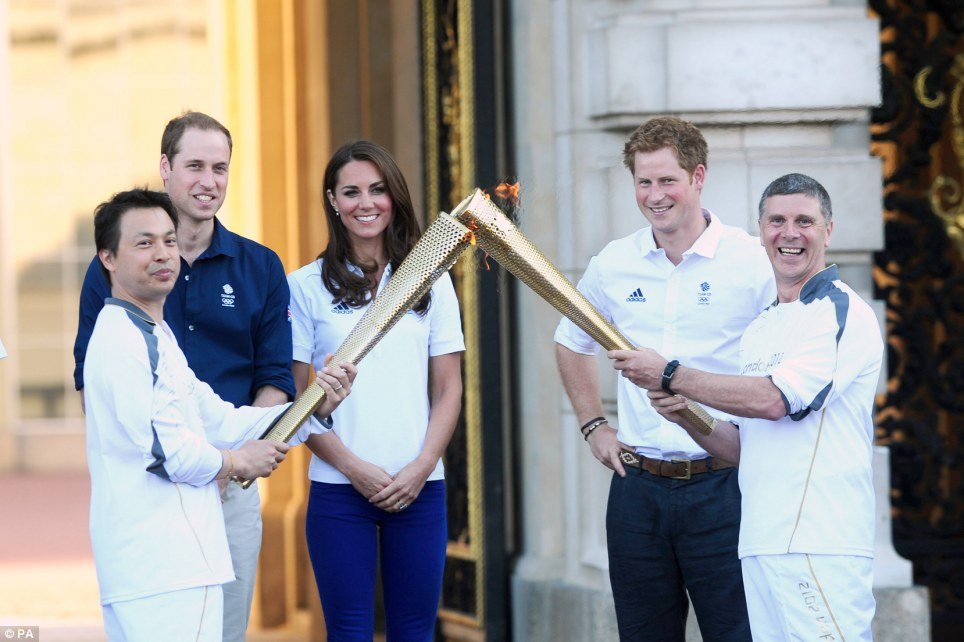
The Olympic torch has been welcomed to Buckingham Palace by members of the royal family, including Princes William and Harry and the Duchess of Cambridge.
Large crowds gathered across London to see the flame on the penultimate day of its journey around the British Isles.
The torch relay also passed through Downing Street, where it was greeted by Prime Minister David Cameron.
David Cameron earlier said the London Games would show the world “beyond doubt that Britain can deliver”.
The flame ended the day in Hyde Park where the final torchbearer lit a cauldron in front of 60,000 people who have gathered for a celebratory concert.
London Mayor Boris Johnson wished the crowds a “wonderful” Olympics, and thanked them for their support.
“Are we ready? Yes we are,” Boris Johnson said, in a rallying cry to the audience.

Meanwhile, Great Britain’s men’s football team is taking on Senegal at Manchester’s Old Trafford ground.
On Friday, the Olympics will be officially opened by the Queen and the torch’s journey will come to an end during the opening ceremony.
A unanimous decision has been made over who will light the Olympic Stadium’s cauldron, LOCOG said, but it will be kept secret until the ceremony.
Earlier, David Cameron told reporters during a news conference at the Olympic Park: “This is a great moment for us. Let’s seize it.”
And he said security was his main concern ahead of the Games – an area he said he takes “personal responsibility for”.
David Cameron described a blunder in which North Korean footballers’ images were shown next to the South Korean flag as an “honest mistake”.
The prime minister called the eve of the Games “a truly momentous day for our country”.
“Seven years of waiting, planning, building, dreaming, are almost over – tomorrow, the curtain comes up, the spectators arrive, and the Olympic and Paralympic Games 2012 can officially begin.”
David Cameron also met the Republican candidate for the US presidency, Mitt Romney, during his campaigning and fundraising visit to London.
Mitt Romney had earlier expressed concerns about “disconcerting” signs of a lack of readiness for the Games.
“The stories about the private security firm not having enough people, the supposed strike of the immigration and customs officials – that obviously is not something which is encouraging,” Mitt Romney told a US television station.
It is “hard to know just how well it will turn out”, said Mitt Romney, who managed the Winter Olympics in Salt Lake City in 2002.
David Cameron responded by saying: “Of course, this is a time of some economic difficulty for the UK. Everybody knows that.
“But look at what we’re capable of achieving as a nation, even at a difficult economic time.”
Mitt Romney, who also met Labour leader Ed Miliband, later said outside Number 10: “I expect the Games to be highly successful.”
In other developments:
• Long queues outside St James’s Park in Newcastle meant some football fans missed the start of Mexico v South Korea
• The PM met David Beckham at Downing Street to discuss how to tackle world hunger. It came ahead of a “hunger summit” on the final day of the Games, Sunday 12 August
• A planned strike by East Midlands Trains (EMT) during the Games was called off after a pensions dispute was settled
• LOCOG apologized after an official football programme listed Welsh footballer Joe Allen as English. It said the error would be corrected for Team GB’s next match
• A global investment conference in London kicked off a series of business summits intended to showcase the UK and attract investment during the Games
• A new record for arrivals at Heathrow is expected to be set on Thursday, with up to 125,000 incoming passengers
[youtube hnRFedVoggg]
The 2012 Olympic Games are one of the most highly anticipated events on TV. I remember my mom made sure that we watched them whenever they were on growing up. I’ve come to discover that I’m an Olympic junkie and I’m pretty excited for things to get started tomorrow. I’ll be missing most of the games since I’ll be at work but I just upgraded to the Hopper. The Hopper comes with 2 terabytes of space for recording which is fantastic. That’s four times more space than your average DVR. That way I won’t have to clear stuff off of my DVR right away. A Dish co-worker recommended it to me after she tried it for the show Once Upon A Time. I hope Team USA does well this year.